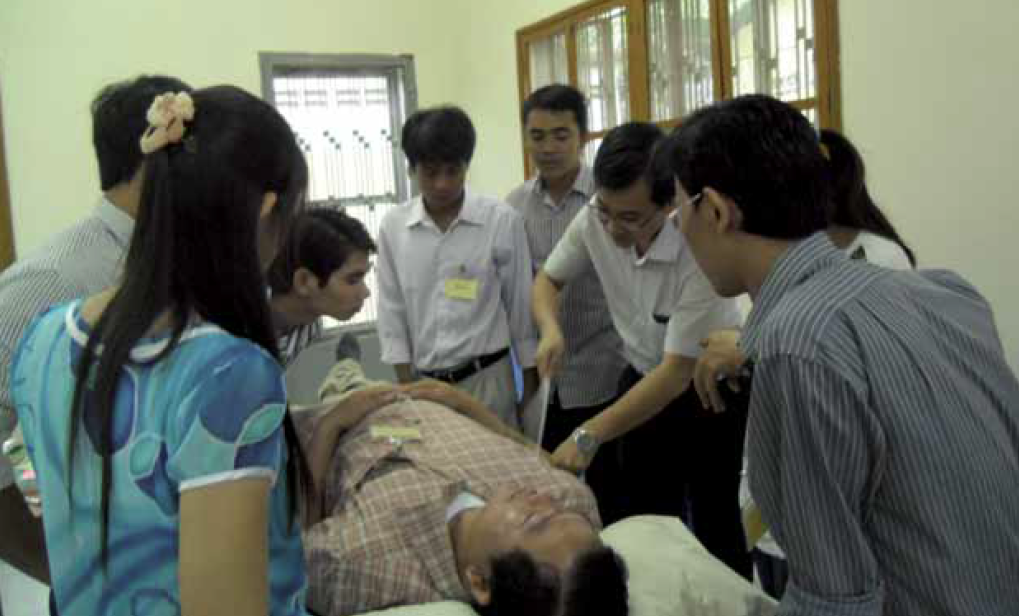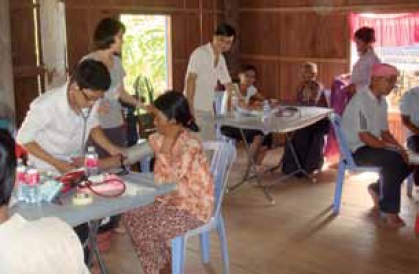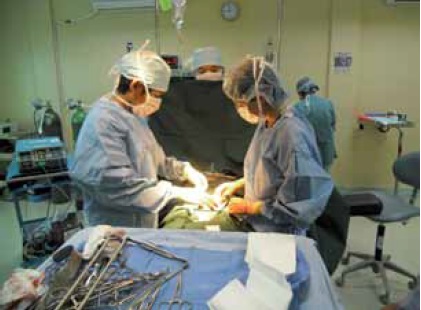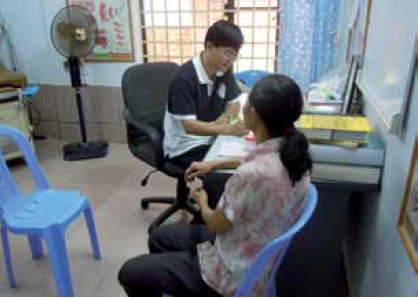Hong Kong Med J 2014;20:266–7 | Number 3, June 2014
© Hong Kong Academy of Medicine. CC BY-NC-ND 4.0
DOCTOR FOR SOCIETY
Unwavering dedication
Dr Grace Lau Yuk-fung
and Dr Paul Wong Kin-shing — their endeavour for better medical
service in Cambodia
Bowie Kung, Sophomore, Mount Holyoke
College (previously: Faculty of Medicine, The University of Hong
Kong); Jane Ko, Year 5, Faculty of Medicine, The University of
Hong Kong
A poster of a starving child. News of
ongoing war in Syria. We are often disturbed and moved by such
images in the media, but how many of us have actually considered
travelling to those places and helping those in need? Dr Grace Lau
(MBBS 1988), a gynaecologist and obstetrician, and Dr Paul Wong
(MBBS 1985), a nephrologist, are two such people, whose work and
dedication inspired, and continue to inspire, many individuals. In
the past 4 years (2009-2013), the family (together with their two
children) have been serving in Cambodia as missionary doctors.
Dr Paul Wong was with Pamela Youde
Nethersole Eastern Hospital since its establishment and was in
charge of setting up the renal dialysis unit there. Dr Grace Lau
was in private practice. She continues to see patients once a week
when she is in Hong Kong, especially those who insist on being
examined by her.
From vision to action
Both Dr Lau and Dr Wong wished to go abroad
for community service ever since they were medical students at the
University of Hong Kong. They wanted to use their knowledge and
skills as doctors to help others, not only those in Hong Kong, but
also the under-privileged people in developing countries. Since
1995, they have been members of short-term medical teams organised
every year by their church, to serve the villagers in Cambodia.
After practising thus for 14 years, their passion to serve the
Cambodian people was further enhanced. In 2009, they decided to
commit to serve on site as long-term missionary doctors.
They understood the difference in service
that they could make by moving to live there. They found that they
could better recognise the needs and mentality of local Cambodian
patients if they were immersed in their culture and language. The
best way to effectively mentor local young doctors and medical
students was walking and working alongside them, so that they
could create a deeper impact on their values, and build good
ethics in their medical practice.
Cambodia — a broken nation
Cambodia is a nation with a broken past.
The Vietnam War, civil war and the Khmer Rouge regime’s purges in
the 1970s left the country in tatters. Nearly two million
Cambodians lost their lives during that period. Thousands more
were killed or maimed by landmines left behind from that era.
In 1993, Cambodia started its
reconstruction with help from many countries and international
non-governmental organisations (NGOs). The country faced problems
such as poverty, human trafficking, lack of education, and
inflation. Medical and healthcare needs were tremendous. With poor
hygiene and lack of clean water, tuberculosis and human
immunodeficiency virus (HIV) infections are still dire problems,
with the prevalence of HIV being especially high (14%) among
female sex workers. Today, Cambodia remains one of the poorest
countries in the world.
Holistic care with scarce resources
Dr Wong and Dr Lau have been working in
Mercy Medical Centre (MMC), an establishment built 10 years ago by
a Christian NGO from the United States. Run by predominantly
volunteer healthcare workers from different countries, the clinic
provides holistic, quality medical care to poor patients from all
over Cambodia.
Due to resource limitations, certain
treatable illnesses are not curable in that setting. However, with
a holistic approach, all patients are treated with respect and
dignity. A patient with advanced cancer would rather pass away
with dignity in MMC than seek help from local hospitals. These
experiences clearly illustrate that advanced technology is not
everything when it comes to treating patients; serving with
respect and compassion is equally, if not more, important.
Tackling the source
Due to the fact that many of Cambodia’s
medical problems are iatrogenic, Dr Lau and Dr Wong collaborated
with several other doctors to organise a course in family medicine
in the hope of training young local doctors to be safe doctors. It
turned out to be a popular course, and they continued to expand on
this as one of the many tasks for bettering the medical system.
Through small-group teaching and journeying with medical students,
they were able to exert personal influence on medical students and
impact their values and attitudes in caring for patients.
Life lessons
Through their work in Cambodia, they
established a closer relationship with God. They realised that
things may not go as planned, that many things are beyond their
capacity, and that sometimes, they simply have no control over
certain factors. This humbling experience led them to depend more
on prayers and divine guidance.
Future plans
Dr Lau and Dr Wong plan to return to
Cambodia in July 2014. Although both doctors are specialists, they
try to cater to the primary care needs of the Cambodians. They
have ideas about further exploring community-based primary care
and providing more holistic hospital training. On the other hand,
Dr Wong also has thoughts about setting up a dialysis unit. All
their plans require immense manpower and resources. They sincerely
urge the community of doctors, nurses, medical students, and other
healthcare professionals to lend a helping hand by sharing their
talent and knowledge in health education, teaching, and managing
mobile clinics.
A message to all
When asked what advice they would offer current
medical students and fresh medical graduates,
both doctors expressed an unfaltering and resolute
view. “Here in Hong Kong, doctors and healthcare
professionals are provided with high-quality training.
We should think of ways outside our work area
where we can share our expertise and resources to
serve others. Think about what being a healthcare
professional really means to you,” said Dr Lau.
Dr Wong quoted the words of Jesus: It is more blessed to give than to receive
(施比受更為有福). He
said, “The happiness from satisfying one’s ego isn’t
long-lasting at all. It is by sharing what we have and
touching the lives of others that we enjoy the utmost
bliss. Everyone has a calling in life. We have found
our calling and it has unceasingly enriched our lives.”





